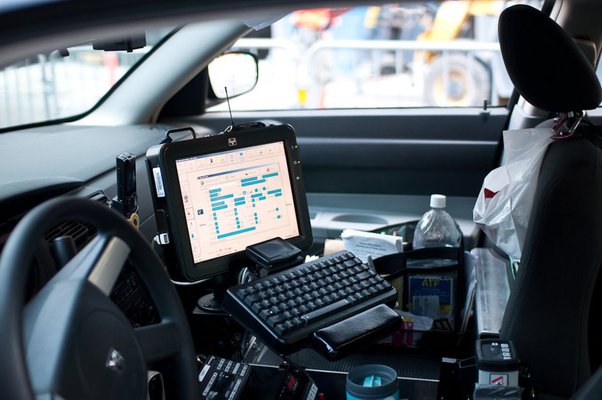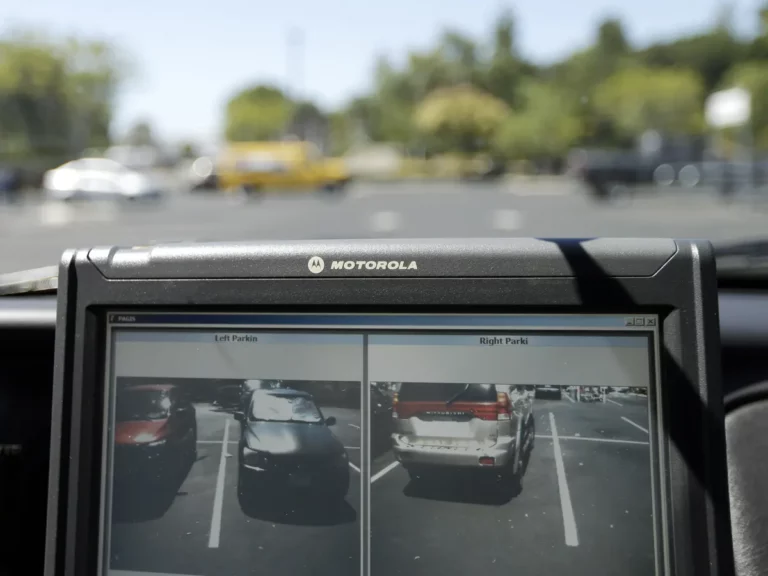In the UK, when the police run your plates, they check your vehicle details, registration, insurance, and owner info. They also look for warrants, ensure tax and MOT are current, and, if necessary, inspect past criminal records. This process is called Automatic Number Plate Recognition (ANPR)
These checks help keep the roads safe and enforce the law.
Let’s explore more details about it.
The Mechanism of License Plate Scanning by Law Enforcement
Before delving into the details of how law enforcement runs your plates, it’s crucial to establish that they can indeed do so without your awareness. Legally, the police possess the authority to run your vehicle’s plates at their discretion. Now, let’s explore the mechanics of this process.
Modern technology equips law enforcement agencies with Automated License Plate Readers (ALPRs), which seamlessly integrate high-speed cameras and advanced software. Here’s a breakdown of the process:
Image Capture: High-speed cameras play a pivotal role by capturing clear images of them. These cameras are strategically positioned on various platforms, including law enforcement vehicles, traffic lights, road signs, or even affixed to bridges.
Data Conversion: The images of the license plates are then subjected to the transformative power of specialized software. This software converts the visual data into a readable format, essentially translating the license plate characters into text.
Database Comparison: The converted license is subsequently compared with a myriad of databases. These databases include information on registered vehicles, individuals, and any associated criminal or vehicular histories.
Record Logging: As part of the process, ALPRs also document the date, time, and geographical location of the vehicle at the moment the scan is performed. This record-keeping aids in building a comprehensive database of vehicular movements.
Comprehensive Data Revealed When Running License Plates

Vehicle Information: The data retrieved includes essential details about the vehicle, such as the year of manufacture, the Vehicle Identification Number (VIN), the vehicle’s license expiration date, and the name of the current registered owner. Any potential suspensions or restrictions on the vehicle’s registration are also accessible.
Driver’s Information: Typically a vehicle is registered to the person operating it. Upon querying the plates, the police can identify the registrant’s name and then perform a secondary search to extract additional driver-related information.
Morover, this secondary search yields data like the registrant’s social security number, date of birth, and residential address. Moreover, the database can provide a detailed physical description, including height and eye color, aiding in determining whether the driver matches the registrant’s description.
Criminal History: In addition to the aforementioned information, the search reveals the registrant’s prior driving record, any history of criminal offenses, or the existence of outstanding arrest warrants against the registrant.
In some regions law enforcement agencies may also have the capability to access both local and national databases to ascertain if there are any warrants issued in other states. Consequently, if an individual with outstanding warrants is pulled over after a plate scan, they can be subject to arrest.
Common Reasons Why Police Can Access License Plate Information
Verifying Vehicle Registration: One prevalent motive for police plate scans is to confirm a vehicle’s registration status. Although it’s practically impossible to scrutinize every vehicle, if officers notice a missing registration sticker or suspect an expired, revoked, or invalid registration, they will likely run the plates.
Then, if your vehicle’s registration has lapsed, you may be pulled over and issued a ticket for driving with an expired or suspended registration.
Identifying Suspected Crime Involvement: Law enforcement might also access license plate data if a vehicle is suspected of being connected to criminal activities. Typically, this occurs when witnesses or victims of a crime can provide a description of the vehicle involved.
Also, police will promptly cross-check the plates with reported crimes in the vicinity. If they believe there’s sufficient evidence linking the vehicle to the crime, they will request a traffic stop.
Detecting Stolen Plates or Vehicles: The law mandates that license plates must correspond to the registered vehicle and cannot be moved between vehicles without updating the registration. This practice proves invaluable in hit-and-run incidents or situations where victims can only recall the license plate seen at a crime scene.
Further, if a perpetrator attempts to conceal their vehicle’s involvement in a crime by placing the license plate on another vehicle, they can face theft charges. Similarly, law enforcement runs license plates to identify stolen vehicles. If the plate matches the description of a reported stolen vehicle, the driver may be pulled over.
FAQs
Is Running Your License Plate A Violation Of the Fourth Amendment?
Yes, The Fourth Amendment protects individuals from unreasonable searches and seizures, but it does not apply to license plates, as they are considered public information that law enforcement can access for legitimate government interests, such as public safety. Police can check license plates without violating Fourth Amendment rights.
What do police see when they run your name UK?
When police in the UK run your name, they can access information related to your identity, including criminal records, outstanding warrants, and other relevant details for law enforcement purposes.
Do police cars scan license plates UK?
Yes, police cars in the UK are equipped with Automatic Number Plate Recognition (ANPR) systems, which scan license plates to check for various legal and safety issues, including vehicle registration status, insurance, and potential connections to criminal activities.
How can the police prove I was on my phone UK?
In the UK, police can use various methods to prove that a driver was using their phone while driving, such as eyewitness testimony, dashcam footage, or phone records. It is illegal to use a handheld mobile device while driving in the UK.
Can you refuse to exit your vehicle UK?
Yes, In the UK, you can refuse to exit your vehicle if asked by the police, but it is advisable to comply with their instructions and cooperate. Refusal to exit may escalate the situation and could have legal consequences.
Is it illegal to swear at a police officer UK?
No, Swearing at a police officer in the UK is generally not illegal, but it is considered disrespectful and may lead to charges of disorderly conduct if it causes a breach of the peace or disrupts law enforcement duties.
Do I have to give my name to police UK?
Yes, In the UK, you may be required to provide your name and other identification information to the police if they have reasonable grounds to believe you have committed an offense, are about to commit an offense, or are a witness to an offense. Failure to provide your name in such circumstances may lead to legal consequences.
Final Words
To sum up, when police run your license plates in the UK, they gain access to a wealth of information that aids them in ensuring public safety and enforcing the law. This includes details about the vehicle, the registered owner, any outstanding warrants, and more.
Furthermore, the technology enables law enforcement to efficiently verify vehicle information and address potential legal issues, contributing to a safer and more secure community. Understanding the information accessible to the police in such checks is essential for both drivers and law enforcement agencies as they carry out their responsibilities.

